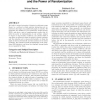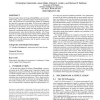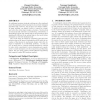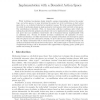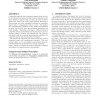SIGECOM
2006
ACM
15 years 6 months ago
2006
ACM
We study a natural extension of classical evolutionary game theory to a setting in which pairwise interactions are restricted to the edges of an undirected graph or network. We ge...
109
click to vote
SIGECOM
2006
ACM
15 years 6 months ago
2006
ACM
We present and evaluate the design of Deep Maize, our entry in the 2005 Trading Agent Competition Supply Chain Management scenario. The central idea is to decompose the problem by...
SIGECOM
2006
ACM
15 years 6 months ago
2006
ACM
We study coalitional games where the value of cooperation among the agents are solely determined by the attributes the agents possess, with no assumption as to how these attribute...
117
click to vote
SIGECOM
2006
ACM
15 years 6 months ago
2006
ACM
We present a reduction from graphical games to Markov random fields so that pure Nash equilibria in the former can be found by statistical inference on the latter. Our result, wh...
97
Voted
SIGECOM
2006
ACM
15 years 6 months ago
2006
ACM
In multiagent systems, strategic settings are often analyzed under the assumption that the players choose their strategies simultaneously. However, this model is not always realis...
101
Voted
SIGECOM
2006
ACM
15 years 6 months ago
2006
ACM
We consider a multicast game with selfish non-cooperative players. There is a special source node and each player is interested in connecting to the source by making a routing de...
107
Voted
SIGECOM
2006
ACM
15 years 6 months ago
2006
ACM
Finding an equilibrium of an extensive form game of imperfect information is a fundamental problem in computational game theory, but current techniques do not scale to large games...
89
Voted
SIGECOM
2006
ACM
15 years 6 months ago
2006
ACM
While traditional mechanism design typically assumes isomorphism between the agents’ type- and action spaces, in many situations the agents face strict restrictions on their act...
70
Voted
SIGECOM
2006
ACM
15 years 6 months ago
2006
ACM
81
Voted
SIGECOM
2006
ACM
15 years 6 months ago
2006
ACM
